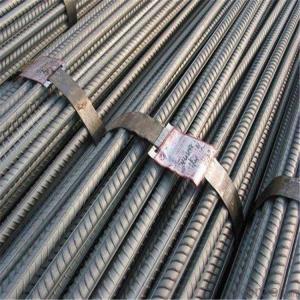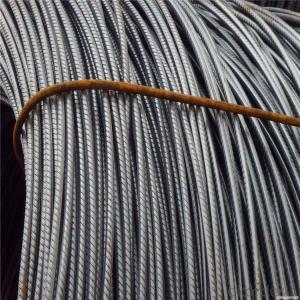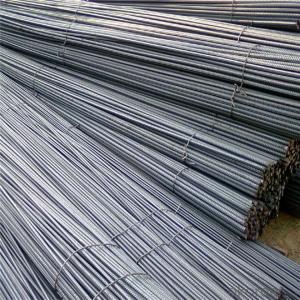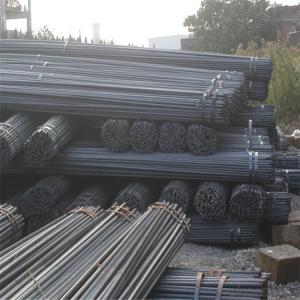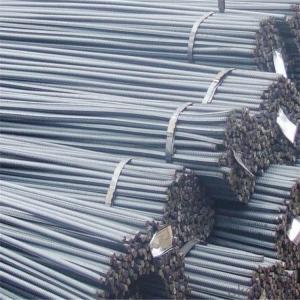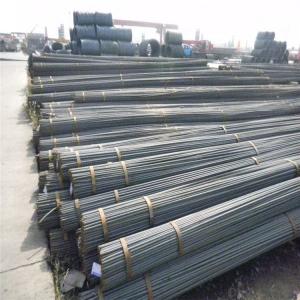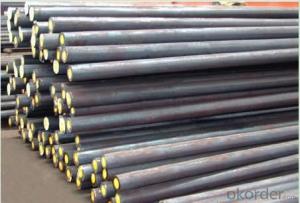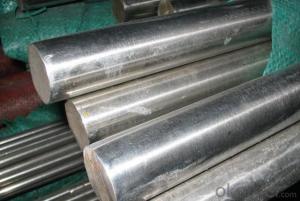Deformed Bars BS4449 B460B for Construction
- Loading Port:
- Tianjin
- Payment Terms:
- TT or LC
- Min Order Qty:
- 100 m.t.
- Supply Capability:
- 500000 m.t./month
OKorder Service Pledge
OKorder Financial Service
You Might Also Like
Item specifice
Deformed Bars BS4449 B460B for Construction
Description of Deformed Bars BS4449 B460B for Construction
1, Diameter: 5.5mm-10mm Deformed Bars BS4449 B460B for Constructionr
10m- 40mm Deformed Bars BS4449 B460B for Construction
2, Length: 6m, 9m, 12m or customized
3, Standard: GB, ASTM, AISI, SAE, DIN, JIS, EN
OEM technology - send detailed technical parameters for accurate quotation.
2, Produce Process: smelt iron - EAF smelt billet - ESR smelt billet -
hot rolled or forged to get the steel round bar and plate
3, Heat Treatment: annealing, normalizing, tempering, quenching
4, Surface Treatment: Black
5, Quality Assurance: We accept third party inspection for all orders.
You can ask testing organizations such as SGS, BV, etc. to test our products before shipping.
Chemical Composition of Deformed Bars BS4449 B460B for Construction
Grade | Technical data of the original chemical composition(%) | |||||
Reinforcing steel bar HRB335 | C | Mn | Si | S | P | B |
≤0.25 | ≤1.60 | ≤0.80 | ≤0.045 | ≤0.045 | >0.0008 | |
Physics Capability | ||||||
Yield Strength(N/cm2) | Tensile Strength(N/cm2) | Elongation(%) | ||||
≥ 335 | ≥490 | ≥16 | ||||
Reinforcing steel bar HRB400 | C | Mn | Si | S | P | B |
≤0.25 | ≤0.16 | ≤0.80 | ≤0.045 | ≤0.045 | 0.04-0.12 | |
Physics Capability | ||||||
Yield Strength(N/cm2) | Tensile Strength(N/cm2) | Elongation(%) | ||||
≥ 400 | ≥ 570 | ≥ 14 | ||||
Products Show of Deformed Bars BS4449 B460B for Construction
Company Information
CNBM International Corporation is the most important trading platform of CNBM group.
Whith its advantages, CNBM International are mainly concentrate on Cement, Glass, Iron and Steel, Ceramics industries and devotes herself for supplying high qulity series of refractories as well as technical consultancies and logistics solutions.


F A Q
1, Your advantages?
professional products inquiry, products knowledge train (for agents), smooth goods delivery, excellent customer solution proposale
2, Test & Certificate?
SGS test is available, customer inspection before shipping is welcome, third party inspection is no problem
3, Factory or Trading Company?
CNBM is a trading company but we have so many protocol factories and CNBM works as a trading department of these factories. Also CNBM is the holding company of many factories.
4, Payment Terms?
30% TT as deposit and 70% before delivery.
Irrevocable L/C at sight.
5, Trading Terms?
EXW, FOB, CIF, FFR, CNF
6, After-sale Service?
CNBM provides the services and support you need for every step of our cooperation. We're the business partner you can trust.
For any problem, please kindly contact us at any your convenient time.
We'll reply you in our first priority within 24 hours.
- Q:What are the different methods of preventing stress corrosion cracking in special steel?
- There are several methods to prevent stress corrosion cracking in special steel. One common approach is to select a steel alloy with enhanced resistance to stress corrosion cracking. This can be achieved by adding alloying elements such as nickel, chromium, or molybdenum, which help improve the steel's corrosion resistance. Another method is to control the environment in which the steel is exposed. This can involve minimizing exposure to corrosive substances or adjusting temperature and humidity levels. Additionally, surface treatments such as passivation or coating can be applied to create a protective barrier against corrosion. Regular inspection and maintenance of the steel structure are also important to identify and address any potential sources of stress corrosion cracking.
- Q:What are the different forging grades of special steel?
- There are several different forging grades of special steel, each with its own unique characteristics and applications. Some of the most commonly used forging grades include: 1. Carbon Steel: Carbon steel is a popular choice for forging due to its high strength and durability. It contains various amounts of carbon, which determine its hardness and toughness. Carbon steel forgings are commonly used in automotive parts, construction equipment, and machinery. 2. Alloy Steel: Alloy steel is made by adding various alloying elements to carbon steel, such as manganese, chromium, nickel, or molybdenum. This enhances its strength, corrosion resistance, and wear resistance. Alloy steel forgings are widely used in aerospace, defense, oil and gas, and power generation industries. 3. Stainless Steel: Stainless steel is a corrosion-resistant steel alloy that contains a minimum of 10.5% chromium. It is highly resistant to rust and staining, making it suitable for applications in harsh environments or where hygiene is critical. Stainless steel forgings are commonly used in the food processing, chemical, and medical industries. 4. Tool Steel: Tool steel is specifically designed for use in cutting tools, molds, and dies. It has high hardness, wear resistance, and toughness, allowing it to withstand high temperatures and heavy loads. Tool steel forgings are used in the manufacturing of drills, saw blades, punches, and various precision tools. 5. High-Speed Steel: High-speed steel is a type of tool steel that is capable of cutting at high speeds without losing its hardness. It contains additional elements like tungsten, molybdenum, or vanadium, which improve its heat resistance and wear resistance. High-speed steel forgings are used in the production of cutting tools, drills, and milling cutters. 6. Maraging Steel: Maraging steel is a low-carbon, high-nickel steel alloy known for its exceptional strength and toughness. It is heat-treated to achieve high tensile strength while maintaining good ductility. Maraging steel forgings are commonly used in aerospace, defense, and missile systems. These are just a few examples of the different forging grades of special steel available in the market. Each grade offers specific properties suited to different applications, ensuring that the right material can be selected for the desired performance and durability requirements.
- Q:What are some innovative applications of special steel?
- The distinct properties and characteristics of special steel, also known as alloy steel, enable it to be utilized in a wide range of innovative applications. Some of these applications include: 1. Aerospace Industry: The aerospace industry extensively employs special steel for the production of critical components such as turbine blades, landing gears, and structural parts. Its exceptional strength, excellent corrosion resistance, and ability to withstand extreme temperatures make it an optimal choice for these applications. 2. Automotive Industry: Various applications in the automotive industry benefit from special steel, including the manufacture of engine components, suspension systems, and safety-related parts. Its remarkable strength-to-weight ratio and resistance to wear and fatigue ensure enhanced performance, durability, and safety in vehicles. 3. Medical Devices: Special steel finds use in the manufacturing of surgical instruments, implants, and medical equipment. Its biocompatibility, high strength, and corrosion resistance make it suitable for implant use in artificial joints, stents, and dental implants. 4. Energy Sector: The energy sector heavily relies on special steel, particularly in power plants, nuclear reactors, and oil and gas facilities. Special steel pipes and tubes are employed for fluid and gas conveyance, while its ability to withstand high temperatures is crucial for components like steam turbines and boilers. 5. Tooling and Machining: Special steel is extensively utilized in tooling and machining processes due to its exceptional hardness, toughness, and wear resistance. Its application in the production of cutting tools, dies, molds, and machine components ensures precision, extended tool life, and increased productivity. 6. Defense and Security: The defense and security sectors utilize special steel for the production of armored vehicles, ballistic protection, and military-grade equipment. Its capacity to withstand high impact and offer superior protection against projectiles and explosions make it an indispensable material for these applications. 7. Construction and Infrastructure: Special steel is widely employed in the construction industry for applications such as bridges, high-rise buildings, and infrastructure projects. Its high tensile strength, corrosion resistance, and durability ensure structural integrity and safety. 8. Renewable Energy: Special steel is employed in the renewable energy sector, particularly in wind turbines and solar energy systems. Its high strength and resistance to fatigue ensure the reliability and longevity of these energy generation systems. In conclusion, special steel, with its unique properties, finds numerous innovative applications across various industries. From aerospace and automotive to medical devices and renewable energy, this versatile material continues to drive advancements and meet the evolving needs of modern technology and society.
- Q:What are the main applications of special steel in the energy storage industry?
- Special steel is extensively used in the energy storage industry for various applications. Some of the main applications include the manufacturing of high-performance battery components, such as battery casings, terminals, and current collectors. Special steel is also used in the production of energy storage system components like fuel cells, hydrogen storage tanks, and pressure vessels. Additionally, special steel is utilized in the construction of infrastructure for energy storage facilities, such as pipelines, storage tanks, and structural supports. Overall, special steel plays a vital role in enabling efficient and durable energy storage systems in the industry.
- Q:How does special steel contribute to the aerospace racing aftermarket industry?
- Special steel is an essential component in the aerospace racing aftermarket industry as it plays a significant role in enhancing the performance, durability, and safety of aircraft and racing vehicles. Firstly, special steel is used in the manufacturing of critical engine components, such as turbine blades, compressor discs, and shafts. These components must withstand extreme temperatures, pressures, and mechanical stress during operation. Special steel alloys, such as nickel-based superalloys, provide excellent heat resistance, high strength, and exceptional corrosion resistance, ensuring peak performance and reliability of the engine systems. Moreover, special steel is vital in the construction of airframe structures. The lightweight but high-strength properties of special steel alloys, such as titanium alloys, are crucial in reducing the overall weight of aircraft and racing vehicles. This weight reduction contributes to improved fuel efficiency, increased speed, and better handling capabilities, making it an indispensable material in the aerospace racing aftermarket. In addition, special steel is utilized in the production of landing gear systems, which are crucial for safe takeoffs, landings, and overall maneuverability. The landing gear must endure immense forces and shock loads during these operations. Special steel alloys, like chromium-molybdenum steel, offer exceptional toughness, fatigue resistance, and impact strength, ensuring the landing gear's reliability and longevity. Furthermore, special steel plays a crucial role in the manufacturing of aerospace racing aftermarket components, such as fasteners, bearings, and gears. These components require high strength, wear resistance, and dimensional stability to withstand the demanding conditions of racing and provide optimal performance. Special steel alloys, including stainless steel and tool steel, possess these desirable properties, ensuring the longevity and reliability of these crucial components. Overall, special steel's contribution to the aerospace racing aftermarket industry cannot be overstated. Its exceptional properties, including high strength, heat resistance, corrosion resistance, and fatigue resistance, enable the production of reliable, efficient, and high-performance aircraft and racing vehicles. Without special steel, the aerospace racing aftermarket industry would be unable to achieve the level of advanced technology, speed, and safety that it currently enjoys.
- Q:Is the steel column of the steel structure HM a special steel?
- The mid flange H section steel HM (M for Middle English prefix) in GB/T 112631998 this standard inside, not special steel;
- Q:What are the different heat treatment methods used for special steel?
- There are several heat treatment methods used for special steel, each with its own purpose and benefits. These methods are employed to enhance the mechanical properties of the steel, such as hardness, toughness, and strength. Some of the commonly used heat treatment methods for special steel include: 1. Annealing: This method involves heating the steel to a specific temperature and holding it at that temperature for a certain period of time, followed by slow cooling. Annealing helps in reducing the internal stress and improving the machinability of the steel. 2. Normalizing: In this process, the steel is heated to a temperature above its critical range and then allowed to cool in still air. Normalizing refines the grain structure of the steel, making it more uniform and improving its strength and toughness. 3. Quenching: Quenching is a rapid cooling process that involves immersing the steel in a quenching medium, such as oil or water, after it has been heated to a specific temperature. This method results in a hardened steel with increased hardness and wear resistance. 4. Tempering: Tempering is a heat treatment process that involves reheating the hardened steel to a specific temperature and then cooling it in still air. This process helps to reduce the brittleness of the steel and improve its toughness and ductility. 5. Austempering: Austempering is a specialized heat treatment method that involves quenching the steel to a temperature just above its martensite transformation range and then holding it at that temperature for a specific time, followed by air cooling. This process produces a steel with a combination of high strength and toughness. 6. Martempering: Martempering is a variation of quenching and tempering, where the steel is quenched and then held at a temperature slightly above its martensite transformation range before air cooling. This method is used to produce a steel with improved toughness and reduced distortion. 7. Nitriding: Nitriding is a surface hardening technique that involves introducing nitrogen into the steel by heating it in an atmosphere of ammonia gas. This process forms a hard nitride layer on the surface of the steel, increasing its hardness, wear resistance, and corrosion resistance. These heat treatment methods are crucial in tailoring the properties of special steel to meet specific requirements in various industries, such as automotive, aerospace, and tool manufacturing. The choice of heat treatment method depends on the desired properties and the intended application of the steel.
- Q:Can special steel be used for medical applications?
- Yes, special steel can be used for medical applications. It is often used for surgical instruments, implants, and medical devices due to its high strength, corrosion resistance, and biocompatibility properties. Special steel alloys are carefully designed to meet the stringent requirements of the medical industry, ensuring safety, durability, and effectiveness in various medical procedures.
- Q:How is high-strength tool steel used in the production of heavy-duty tools?
- High-strength tool steel is utilized in the production of heavy-duty tools due to its exceptional hardness, toughness, and wear resistance properties. This steel is specifically engineered to withstand high stress and extreme conditions, making it ideal for manufacturing tools that require durability and longevity. Heavy-duty tools such as drills, chisels, hammers, and cutting tools often require high-strength tool steel to ensure they can endure rigorous use and maintain their sharpness and functionality over time.
- Q:What are the different mechanical properties of special steel?
- Special steels typically have enhanced mechanical properties compared to regular steels, which makes them suitable for specific applications. Some of the key mechanical properties of special steels include high tensile strength, excellent toughness, improved wear resistance, increased hardness, and enhanced corrosion resistance. Additionally, special steels can exhibit specific properties such as high heat resistance, low thermal expansion, and good machinability, depending on the alloying elements and heat treatment processes used during their production. These unique mechanical properties make special steels highly sought after in industries such as automotive, aerospace, construction, and manufacturing.
1. Manufacturer Overview |
|
|---|---|
| Location | |
| Year Established | |
| Annual Output Value | |
| Main Markets | |
| Company Certifications | |
2. Manufacturer Certificates |
|
|---|---|
| a) Certification Name | |
| Range | |
| Reference | |
| Validity Period | |
3. Manufacturer Capability |
|
|---|---|
| a)Trade Capacity | |
| Nearest Port | |
| Export Percentage | |
| No.of Employees in Trade Department | |
| Language Spoken: | |
| b)Factory Information | |
| Factory Size: | |
| No. of Production Lines | |
| Contract Manufacturing | |
| Product Price Range | |
Send your message to us
Deformed Bars BS4449 B460B for Construction
- Loading Port:
- Tianjin
- Payment Terms:
- TT or LC
- Min Order Qty:
- 100 m.t.
- Supply Capability:
- 500000 m.t./month
OKorder Service Pledge
OKorder Financial Service
Similar products
New products
Hot products
Hot Searches
Related keywords
